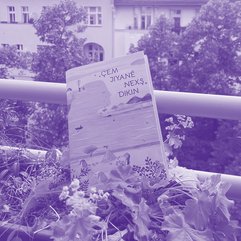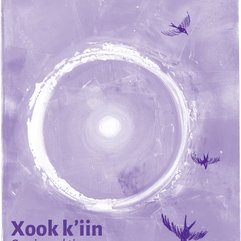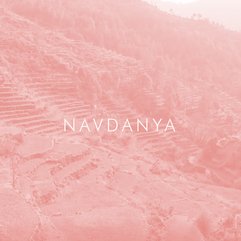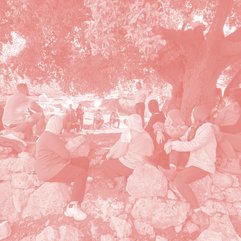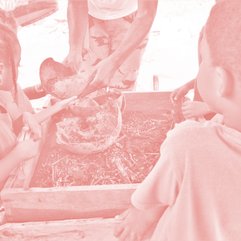University and Scholasticide: From Complicity to Solidarity
Association of Palestinian and Jewish Academics (PJA) – First Annual Conference
10.00-18.30
Save the Date
for adults
in English

This conference seeks to explore the concept of scholasticide as a critical lens through which to understand the ongoing situation in Palestine and the responsibility of universities and educators elsewhere, particularly in Germany. For decades, and particularly since October 2023, scholasticide, as coined by Karma Nabulsi, has been used as a term to describe the intentional and systematic destruction of an educational infrastructure in Palestine and the suppression of academic life due to Israeli military actions in Gaza. The intense bombardments and ground operations have deliberately targeted schools, universities, and academic institutions, resulting in the deaths of students, educators and administrators, as well as the destruction of libraries, classrooms, and research centers.
The use of the term scholasticide, alongside related concepts as educide and epistemicide, makes it possible to grasp the links of causality, continuity, and interdependence between the destruction of an educational system and the eradication of Palestinian life, culture and memory. It also addresses the silencing, marginalization and exclusion of Palestinian researchers in Europe. Additionally, the use of these concepts can help shed light on concerns such as the difficulty of access to education, which Palestinians have experienced for decades, as well as the destruction of future educational opportunities.
Given this devastating situation, this conference asks: what is the responsibility of scholars, researchers and universities worldwide? How are specific academic disciplines and educational institutions either explicitly or inadvertently complicit in this ongoing scholasticide? What forms does such complicity take? What are some of the strategies employed by students, educators and researchers to move beyond complicity towards solidarity with a people whose access to education has not merely been disrupted, but systematically and violently destroyed?

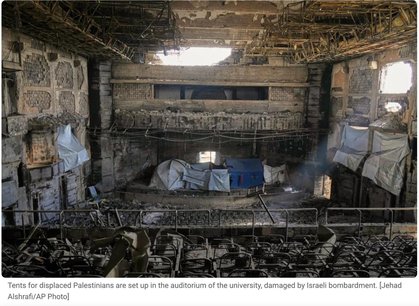 Tents for displaced Palestinians are set up in the auditorium of the Islamic University, damaged by an Israeli bombardment.
Tents for displaced Palestinians are set up in the auditorium of the Islamic University, damaged by an Israeli bombardment.As an association of Palestinian and Jewish academics committed to justice, academic freedom, and anti-colonial scholarship, we convene this conference to critically examine how the global academic community responds to the destruction of Palestinian educational life. This inaugural event reflects our collective concern about the erasure of Palestinian intellectual futures and the moral and legal obligations that scholars and institutions worldwide, particularly in Germany, must reckon with. We invite participants to consider what forms of action are possible in the face of institutional complicity and epistemic violence.
Organised by the Association of Palestinian and Jewish Academics (PJA)
Participants
Dana Abdel Fatah* (Berlin, DE), Najat Abdulhaq (Birzeit, PA), Alice von Bieberstein (Berlin, DE), Luis Cortés (Berlin, DE), Roser Garí Pérez (Berlin, DE), Aurélia Kalisky* (Berlin, DE), Feras Hammami (Göteborg, SE), Elad Lapidot* (Lille/Berlin, FR/DE), Nitzan Lebovic (Bethlehem, USA), Agata Lisiak (Berlin, DE), Rafaëlle Maison (Paris, FR), Mimo (Berlin, DE), Dirk Moses (New York, USA), Ben Ratskoff (Los Angeles, USA), Nahed Samour* (Nijmegen, NL), Sbeih Sbeih (Lyon, FR), Marc Siegel* (Mainz, DE), and Jorge Vega (Berlin, DE).
* PJA member
Schedule
10 am
Introduction: Why an Annual PJA Conference?
Aurélia Kalisky, Nahed Samour, and Marc Siegel
10:30 – 11:30 am
Complicity and Responsibility
Nitzan Lebovic and Nahed Samour
Discussant: Elad Lapidot
Coffee break
12 – 1 pm
Comparative Perspectives: Repression, Censorship, Genocide Denial
Rafaelle Maison (online), Alice von Bieberstein, and Sbeih Sbeih (online)
Discussant: Aurélia Kalisky
Lunch
2:30 – 3:30 pm
Student Solidarity Actions
Luis Cortés and Mimo
Discussant: Marc Siegel
3:30 – 4:30 pm
Solidarity with Students
Agata Lisiak and Roser Garí Pérez
Discussant: Ben Ratskoff
Coffee Break
5 – 6:30 pm
Roundtable: Alternative Academic Spaces and Resistant Knowledge Production
Najat Abdulhaq (online), Feras Hammami, Jorge Vega, Dirk Moses
Discussant: Dana Abdel Fatah




